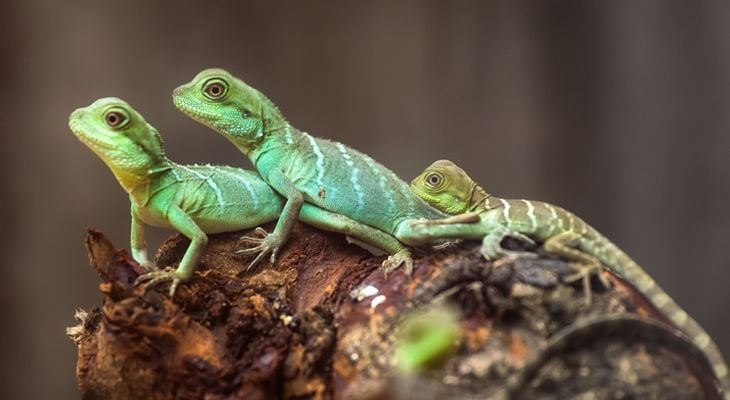Raw diets offer an alternative to commercially prepared pet food and can be a good choice for some pets. Serving raw foods offer a variety of benefits, although the diet isn't appropriate for every cat or dog. Why Offer Raw Food? Commercially available pet food often contains preservatives or chemicals
Read more

People with limited living quarters may find that reptiles such as lizards or turtles fit perfectly into their lifestyles. Before deciding on a reptile, learn as much as possible about them and their needs. Poisonous snakes and certain reptiles should never be kept as pets. Ask your veterinarian about the suitability of a particular animal before you make your decision. There are many things to consider before committing to a reptile as a pet.
Finding out if a Pet is Legal Where You Live
Many areas have enacted laws pertaining to keeping reptiles. Some are general and some are quite specific; in many places any reptiles that are considered dangerous (venomous snakes, alligators, etc.) are illegal but some places are even more restrictive (for example, in some states all constricting snakes including ball pythons are illegal).
Salmonella Risks and Prevention
All reptile owners need to be informed about Salmonella infections. While the risks shouldn't keep most people from keeping reptiles since with the proper management the risks are minimal. Still, owners should be aware of the risks, and the US Centers for Disease Control recommends that certain risk groups should be careful about contact with reptiles and amphibians.
The Importance of Light and Heat
Many problems with keeping reptiles can be traced back to not providing the proper environmental conditions, particularly heat. Proper lighting is also important for many reptiles. The equipment to provide the proper heat and light to captive reptiles is often quite expensive, but is absolutely essential to keeping pet reptiles healthy. It is important to find out exactly what conditions your reptile needs and never cut corners when it comes to meeting those conditions!
Why Choose Captive Bred Reptiles
There are numerous reasons why you should pick a captive bred reptile if at all possible, as explained here.
How to Pick a Healthy Reptile
It is important to keep in mind that depending on where you get a reptile, it may be very stressed, dehydrated, and prone to illness. Here are some items to look for when buying your reptile to increase the chances of picking out a healthy pet reptile.
While there are many types of reptiles that could be good pets, here we cover a few you could consider.
-
What is a Raw Diet?
-
Is Your Pet Overweight?
Packing on the pounds is just as dangerous for your pet as it is for you. Being overweight or obese can lead to many of the same health problems whether you are a human, dog or cat. Luckily, with your help, your furry friend can easily lose that excess weight and enjoy a healthier, happier life with your help.
Read more -
Adopting a Pet From a Rescue Group
Are you interested in adopting a pet from a rescue group but aren't sure if it's the best option for you? We answer a few common questions about rescue groups and explain how adoptions work. What Is the Difference Between Shelters, Humane Societies, and Rescue Groups? Shelters are usually run by cities
Read more -
Who's Healthier: Purebreds or Mixed Breeds?
For years, pet owners have disagreed about whether purebred or mixed breed dogs are healthier. Until recently, there was no scientific data to back up their opinions, but UC Davis researchers recently helped answer the question with a landmark health study. The Arguments Pet owners who thought that
Read more -
What is Mange?
Has your pet suddenly started losing hair? Mange may be to blame. The common skin condition affects dogs, cats and rabbits, causing a variety of uncomfortable symptoms. Tiny Mites Cause Big Problems Mange is caused by a mite infestation. The microscopic parasites either burrow under your pet's skin
Read more -
Tortoises
Tortoises can make an interesting pet, although they can present a challenge, due to their size and dietary habits. Their diets vary based on species, but all need quite a variety of foods, with careful attention paid to the amount of roughage as well as calcium/phosphorus balance. Some species have
Read more -
Animal Shelter
Animal shelters, or what used to be known as pounds, are either governmental or private organizations that provide temporary homes for stray, surrendered, or abandoned pet animals. They most often house dogs and cats. The animal is kept at the shelter until it is reclaimed by the owner, adopted to a
Read more -
Breeder
Buying from a reputable breeder gives you the opportunity to interact with the pets family, siblings, dam, also possibly the sire. You can, therefore, form a general impression of what the future holds for the pet you take home. A responsible breeder is a good source for a well-bred, healthy pet. The
Read more -
Microchipping Your Pet
Each year, nearly 8 million animals end up in local shelters. Of those 8 million pets, data shows that less than 20 percent of lost dogs and less than 2 percent of missing cats are ever returned to their original owners. Thankfully, there are some useful tools available to help pet owners who have lost
Read more -
Multiple Pets Benefit Families
Just like humans, furry family members need to have company, playmates and social interactions to be happy. Sometimes it's hard to remember that our family pets are animals first and family second. We typically look at the benefits of pets in homes from the standpoint of work and expense involved.
Read more -
New Pet? 7 Questions to Ask Your Family Veterinarian
Your new family member may be furry with whiskers and a tail, or have scales, hooves or even wings. If you're the proud new owner of a new pet, chances are you'll have best results integrating your new pet into your family when you include a veterinarian on your team. "Having a new pet isn't like having
Read more -
New Pets Help Families in a Changing World
There is no doubt that we find the little round heads and big eyes of young puppies and kittens irresistible. Millions of new pets find their ways into our hearts and homes each year. Studies show pets are a very positive addition to families or singles and even empty nesters! Pets relieve stress, add
Read more -
Pet Ownership and Your Health
Your pets provide companionship, unconditional love and plenty of smiles, but they also make you healthier just by living with you. The health benefits of owning a pet are both physical and psychological, and they extend throughout an owner’s life. By keeping your furry companion healthy and happy,
Read more -
Pet Therapy
Are you dealing with extreme levels of emotional stress, exhaustion or depression? If so, pet therapy might be right for you. Companionship is only one of the many benefits pet therapy provides. Keep reading to find out what pet therapy involves, which conditions it can help treat and why you might benefit
Read more -
Pet Travel Tips
Are you planning to hit the road with your pets this summer? Whether you are planning a lengthy family road trip or a quick summer getaway, there are some important things you need to know before making the decision to travel with your pets. Use the following tips to guarantee a safe and stress-free
Read more -
Pets Can Teach Children How to Nurture and Care
Gail Melson, author of Why the Wild Things Are: Animals in the Lives of Children has been watching animals and children for some time. She estimates that of every ten children, four grow up in a home that includes domestic animals. She has determined that as many as 90 percent of all youngsters live
Read more

